
New research has highlighted the many ways women's sleep is disrupted on a nightly basis, leading experts to coin the term the ‘rest gap’ - and mums are suffering the most.
We're all often left wondering why we're so tired all of the time - especially when there are young kids running around the house and demanding attention. The answer is normally quite simple. We're all dealing with a lack of sleep, trying to figure out how we can stop kids from waking up too early and getting us out of bed when all we want is to lie in past sunrise.
But there may be more to it than that, for women anyway. Recent research has highlighted a whole host of different issues that disrupt women's sleep and some are more surprising than others.
According to research conducted by the National Sleep Foundation, women tend to report more sleep trouble than men. Not only is this because they often have to deal with hormone-related issues like hot flashes or nausea during pregnancy, perimenopause and menopause, which disrupt sleep, but also because of societal pressures that stop them from getting rest.
“Societally, there’s so many different reasons why [women get less sleep then men] and why women often don’t give themselves permission to rest,” Tasha Bailey, a psychotherapist, told HuffPost. “As women, we’ve been primed to be people-pleasers. When we’re children, we’re often celebrated for being nurturing and showing empathy and cooperation. That then leads many women to disregard their own need for rest and to keep working, pushing on and eventually burning out."
The findings have lead to the coining of a new term. The 'rest gap' describes the way in which women get less sleep than men because of these social factors and gives a name to a phenomenon that's long been ignored.
Speaking about the new term, psychologist LaWanda Hill shared, “The rest gap speaks to just the ways in which women disproportionately are impacted in society.
“I think you can add the rest gap, you can add the wealth gap, you can add the health gap ... it just really simplifies all the things which we are subjected to because of structures, systems, policies, laws and societal norms."
But while the rest gap is impacting all women, it's especially affecting mums. Social conditioning has taught many that women are meant to be the main caregivers for their kids and, while many men are incredibly involved in their family, the social pressure to be the 'perfect mother' like those seen on social media, leaves many mums exhausted.
This is especially true for working mothers, says Bailey. “Obviously, now we’re in a modern world where women are working but they still have the same expectations to run the family home and to maintain family harmony, yet still hold up a full-time job,” she explained. All of this loads anxiety onto women, anxiety that we often only have time to process when nighttime comes.
"Anxiety often rears its head at the time for women to go to sleep or rest,” Hill said. “So their sleep is disrupted because of the amount of stresses that they have [from just] being a woman in society.
So what can we do? “We’ve got to do a better job of having more emotional boundaries, as hard as it is, so that we can begin to close this gap,” Hill explains. "Because we haven’t capped what we are taking on — as mums, parents and women — then we take on too much."
Realising that slowing down and taking on less isn't a bad thing is so important. We may feel guilty as we watch mumfluencers online seemingly take on everything with no worries, but, in real life, realising your limits and adopting some vital self-care rituals is important. Whether that's setting a boundary with your kids, taking time to explain the mental load to your partner so you can get some stress off your shoulders, or you incorporate some simple but relaxing skincare into your day, any time you take to give yourself some rest will go a long way in helping close the rest gap.
If you're experiencing trouble with your sleep, we've got you covered with tips on how much deep sleep you need and 9 ways to get more of it as well as our list of 15 easy ways to fall asleep fast.







